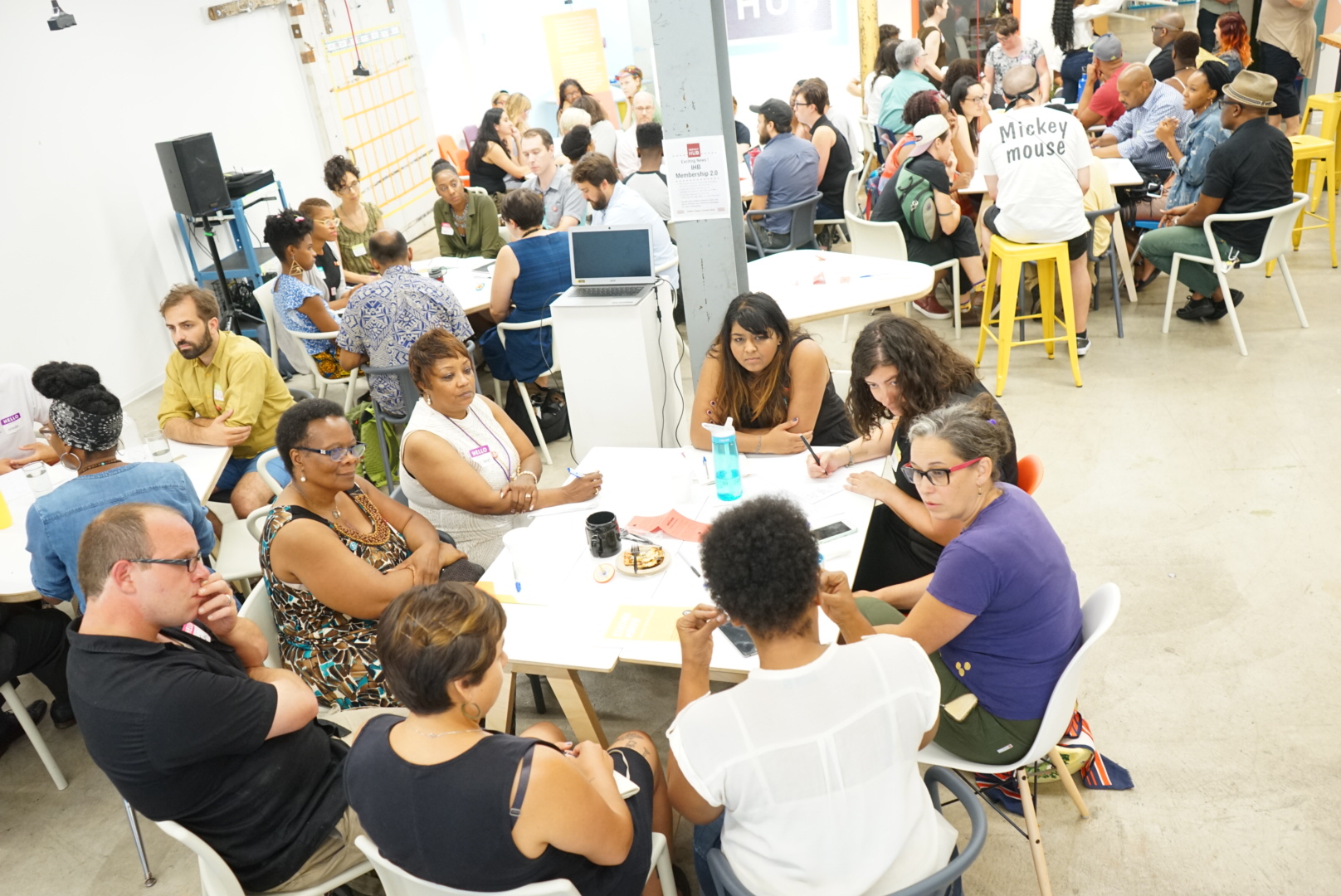The four walls of a space can bring a sense of arrival and even permanence of an address, but the work of building a community doesn’t end with an opening.
In the case of Impact Hub Baltimore, it didn’t even begin there.
When the space opened on the street level of Centre Theater in Station North in 2016, cofounders Michelle Geiss, Pres Adams and Rodney Foxworth had already been at work identifying and connecting local entrepreneurs working on mission-driven ventures for years. They took seeds planted with well-attended SocEnt Breakfasts and an initial coworking space to open a new space that aims to provide a gathering point for the entrepreneurs, activists and artists and other professionals working at the intersection of building sustainable ventures and addressing the city’s deep-rooted challenges.
Over the last three years, the team has grown, membership has ramped up and the Gensler-designed coworking space offered a backdrop for hundreds of events, hackathons, forums, art exhibits and more. It also offers a link to a network of Impact Hub spaces in other cities, and the team has played a role in events that brought a national platform, such as Red Bull Amaphiko Academy.
Yet in the day-to-day work of running the space, the work has always returned to fostering that community. Geiss, who serves as the executive director, said it’s borne of a belief that alongside building ventures that deliver on mission and the money necessary to grow, creating change also requires bringing people together who can offer specific contributions toward a wider effort.
“The complex challenges that Baltimore faces need to have collaborative solutions,” Geiss said, adding, “I’ve seen it come to life in a lot of people’s work in the space.”
Q Ragsdale, who joined around the time the space opened, puts it this way: “Instead of just having the physical space, they have a unique opportunity to leverage people.”
Like any entrepreneurial endeavor, it involves experimentation with new models. And there’s no guarantee that it will work, as indicated by separate Impact Hub franchises have closed in Philly and D.C.
In Baltimore, use of the space is growing. To create an environment where the community can flourish, the key from the beginning has come down to two words: “welcoming and accessible.”
There are evident steps to bring down barriers with design and strategy. Being on the ground floor of a central location in the city on North Ave. that makes it easy to reach from both east and west helps in this regard. There are big, open spaces with a centrally located kitchen, and Impact Hub Baltimore also looks to bring in the community by donating space for events and offering chances for pop-up vendors.
Geiss said one of the largest shifts for Impact Hub Baltimore so far happened in September 2017, when it piloted a reduced membership level offering daily access for $50 a month. It was designed to be more affordable for social entrepreneurs. Even as less money came in per membership, the addition helped grow the number of members by 32 percent to more than 200 members, according to the organization’s recently-released impact report. Growing the community means more likelihood that members will get the right kind of support.
“I think what being in the space has helped people to do is not just plug those gaps but continue to iterate, continue to find people that are relevant, and all along that journey find what they need at the right time,” Geiss said.
Five months after relocating from Texas, Ragsdale had a meeting at Impact Hub Baltimore. Initially glad to find a space that offered a more sustainable workplace than coffee shops, Ragsdale now most values the connections made with people.
“I never really imagined that the most important thing would be the people that worked in the space, and worked for the space…My biz has grown exponentially and even evolved,” said Ragsdale. Meetings followed with organizations working for social change throughout the city. “It was my gateway to the city as a transplant,” he said.
With Twilight Quest, Ragsdale applied marketing and business-building expertise gained in part through corporate experience to running a program that offers training for the service providers who support social entrepreneurs. Team members including Geiss and Adams, along with Michelle Antoinette Nelson and Joe Tynes and Alanah Nichole Davis, also offer key links between the people working to make change at the community level and those who help to sustain the work.
“It was being here around this community of business owners and social enterprise founders that really motivated me to find a way to evolve my business to be more impactful,” Ragsdale said.
Ragsdale is among a group of members that are growing their own ventures while also giving back. To hear advisory board member and founder of Generosity Consulting Jamie McDonald tell it, that group is just as important as the layout, even though it doesn’t happen quite as quickly.
“You need those people that create the beating heart of a community and then they inspire others around them to want to contributing their gifts and energy to it,” McDonald said. “I admire the patience with which they have found their organic community.”
On Thursday, Jan. 24, the space hosts Impact Hub Baltimore: A Fancy & Funky 3rd Anniversary Fête. RSVP.
Join the conversation!
Find news, events, jobs and people who share your interests on Technical.ly's open community Slack

Baltimore daily roundup: Mayoral candidates talk tech and biz; a guide to greentech vocabulary; a Dutch delegation's visit

Baltimore daily roundup: Medtech made in Baltimore; Sen. Sanders visits Morgan State; Humane Ai review debate

Baltimore daily roundup: An HBCU innovation champion's journey; Sen. Sanders visits Morgan State; Humane Ai review debate


